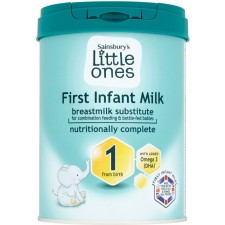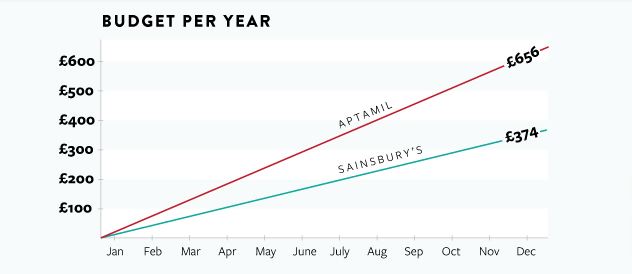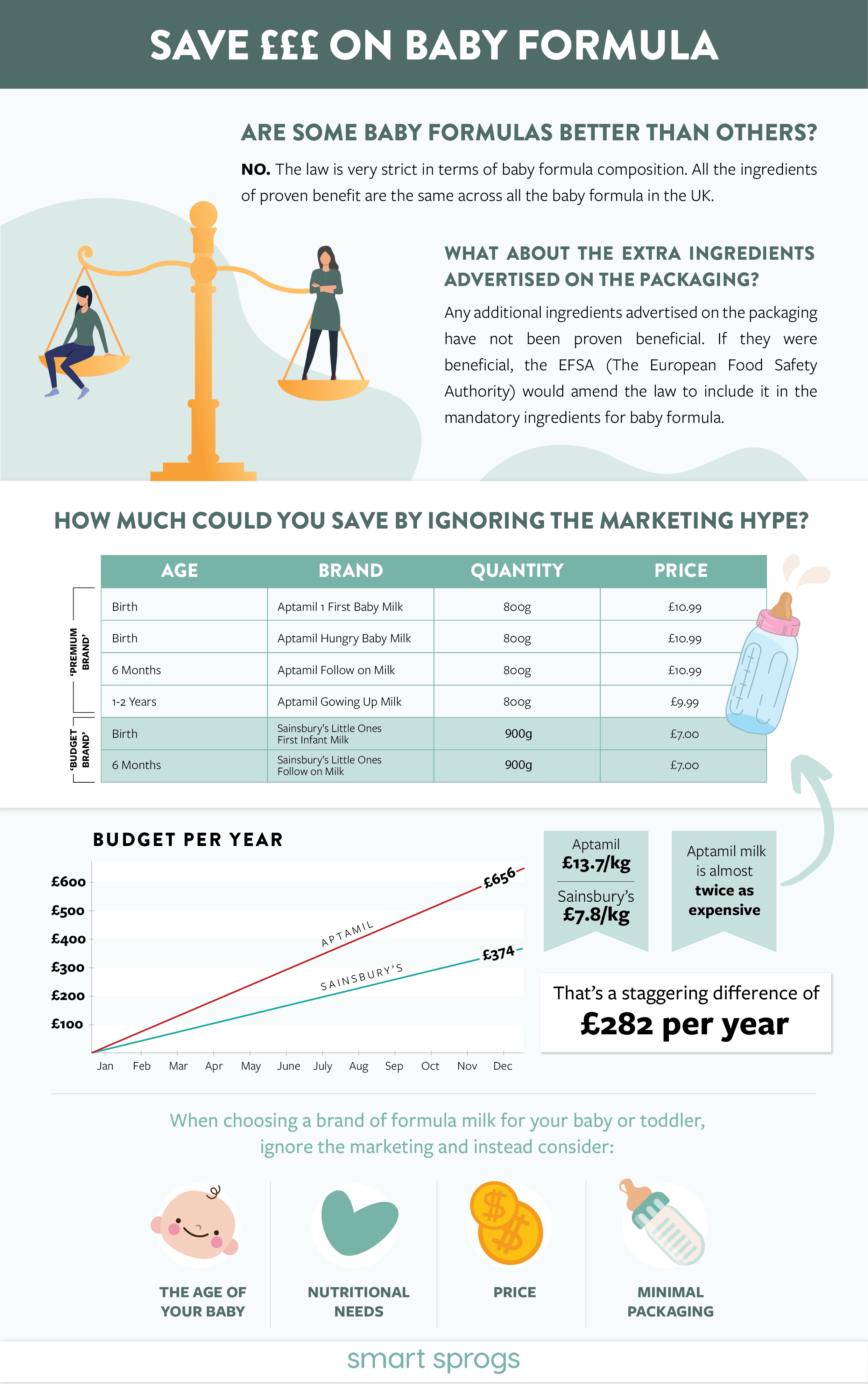Save up to £300 per year on baby formula
Raising children is an expensive business. The most recent ‘Cost of a Child’ report published in 2018 estimated it at an astounding £75,000 from birth to 18 and that’s not including childcare!
Parents of babies and toddlers are a prime target for designers, manufacturers and retailers. The instinct to provide a much-loved child with the best of everything they could ever need and want is, frankly, mercilessly exploited.
The manufacturers of baby formula milk tap into our wish to give their child the highest quality nutrition. Their marketing suggests that their milk is ‘as close to breastmilk’ as it is possible to get and ‘offers the best start in life’.
This leads parents to buy expensive formula over what they perceive to be ‘inferior’ budget brands. I am one of those parents. I try to give the very best to my baby and tend to not buy the cheaper brands.
But I’m wondering if it’s worth it when it comes to baby formula.
How much should you spend on baby formula
There are several brands of baby formula, some fancy some more generic. Your formula budget will depend on the brand you choose.
Let’s crunch the numbers. We’ve compared a premium brand with a budget brand.
The prices are from September 2019
The ‘Premium Brand’

- Aptamil 1 First baby milk from birth £10.99 for 800g
- Aptamil Hungry baby milk from birth £10.99 for 800g
- Aptamil Follow On milk from 6 months £10.99 for 800g
- Aptamil Growing Up milk from 1-2 years £9.99 for 800g
The ‘Budget Brand’

- Sainsbury’s Little Ones First Infant Milk Stage 1 from birth £7.00 for 900g
- Sainsbury’s Little Ones Follow On milk from 6 months £7.00 for 900g
The sums
The prices look very close to each other, only £4 difference by tub. But if you look at the capacity of the Aptamil tub and the Sainsbury’s tub, you realise that they are not the same size. You get smaller tubs with aptamil.
For the comparison to be fair we need the price of each brand for the same quantity of formula. So let’s work out the price per kilogram. The Aptamil is £13.7/kg while the Sainsbury’s one is £7.8/kg.
The Aptamil milk is almost twice as expensive as the Sainsbury formula
Let’s calculate a budget per year. You’ll need approximately 8kg of formula per month.
It brings us to a total budget of £656 for a year buying the Aptamil formula compared to £374 if you buy the Sainsbury’s one. That a staggering difference of £282 per year.

Is that £282 extra justified? Is the premium formula better?
What is the best baby formula?
We often say “you get what you pay for”. Is it the case for the baby formula? Do you get better quality or more nutriments with more expensive baby milk?
I’m not the only one wondering. Earlier this year, Channel 4 ‘Dispatches’ programme studied the claims made by the makers of baby formula and their investigation was very revealing.
They asked Shel Banks, an advisor to the NHS on the feeding of infants, to explain which baby formula was ‘best’. She responded with the following statement:
“There are very clear European Standard Guidelines on the maximum and minimum level of everything – the proteins, the fats, the carbohydrates – there’s nothing to choose between them in terms of nutrition at all.”
So long story short they are all the same.
The law is very strict in terms of baby formula composition. All the ingredients of proven benefit are the same across all the baby formula in the UK. Any additional ingredients advertised on the packaging have not been proven beneficial. If they were beneficial, the EFSA (The European Food Safety Authority) would amend the law to include it in the mandatory ingredients for baby formula.
So the question is why are some formulas more expensive than others?
Is it worth buying expensive formula?
Most of the lists reviews milk based on the packaging, the ease of opening and how you removed the powder from the tin or tub. Few mentioned the ingredients other than to say they were ‘nutritionally complete’ and it would be illegal to sell a milk that wasn’t so this is not a valid part of the review.
It seems that ‘big brands’ such as SMA and Aptamil are charging more than supermarket labels like Sainsbury’s ‘Little Ones’ simply because of their bigger marketing and branding budgets.
The expensive brands will try and justify the extra cost of their milk by talking about ‘added ingredients’. Aptamil, for example, has packaging which claims it contains “A breastmilk substitute with our unique blend of ingredients’. In fact, the ingredients will be the same as all other milks. The only difference will be slight alterations in proportion.
The British Specialist Nutrition Association are the representatives for the formula milk industry. They told the Dispatches investigation that the makers of baby milk can add: “varying levels of ingredients”, “beyond the legal minimum requirements”.
This is a weak argument for charging up to £4 more for a smaller size of tub. In reality should Aptamil contain an extra ingredient, such as Omega 3, which is proven to be beneficial to babies then the law states it must be added to all the other formula milks on the market too.
This extra ingredients have not been proven beneficial and therefore probably useless. Purchasing these formula with extra ingredient is a waste of money.
Baby formula marketing forbidden in the UK
Advertising “first infant formula” is not authorised in the UK. You’ll never see an advertisement for formulas that substitute breast milk. Breast Milk Action explain the law in details.
To try to circumvent the law, formula companies advertise their follow-on milk for babies 6 months and older trying to hook you with their fallacious arguments their formula is better. Implying their formula will make your baby a ballerina or a maths genius, I’m sure you know exactly which advertisement I’m referring to.
Their strategy relies on brand recognition. If you know that brand and you think their follow-on milk is the best for your baby, then you’ll think their first infant milk is also the best. It’s their way to persuade you to buy their first infant formula they can’t advertise.
The social, safety and economic impact of expensive formula
The cost of formula milk and the suggestion that ‘expensive is best’ can have a huge impact on families. These groups are particularly vulnerable.
- Low income families.
- Single parents.
- Parents of twins or triplets.
- Parents of both babies and toddlers.
- Parents of babies with allergies or digestive issues.
At the UNICEF Baby Friendly Conference in 2018 an All- Party Parliamentary Group on Infant Feeding and Inequality discussed concerns over the cost and marketing of baby formula.
- Poverty caused by the cost of formula milk.
- Parents not feeding themselves so they can afford to feed their babies and toddlers.
- Unsafe practises such as the watering down of formula to make it last longer, adding cereal to feeds or skipping feeds.
- The unfair and misleading marketing campaigns of certain formula brands.
The following commitments were made:
- The UK should ban the advertising of breastmilk substitutes to the public.
- Public Heath communications are required to make plain to parents that there are no significant nutritional differences between each brand of formula.
- Research into the unsafe formula feeding practises needs to occur urgently to provide a solution.
- The impact of the cost of formula milk to a family should be considered at all stages of the health and social care, welfare, immigration and benefits system.
Save your money, buy the cheap formula
To sum up, when choosing a brand of formula milk for your baby or toddler pay little attention to the brand and marketing nonsense that they throw at you via advertising and packaging and instead consider:
- The age of your baby.
- Your baby’s nutritional needs such as difficulty with digestion and allergies.
- The price.
- Minimal packaging.




